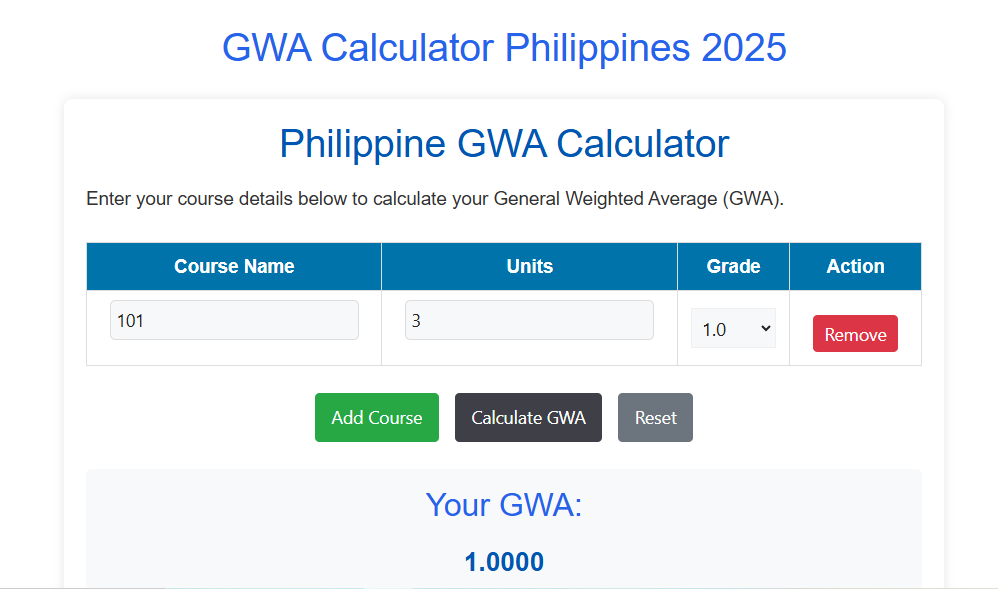Calculate Academic Success with SGPA & CGPA Calculators
SGPA Calculator
What is SGPA?
Assessing academic achievement is an important part of higher education, especially in universities and colleges. Calculating grade point averages (GPA), of which semester grade point average (SGPA) is a key subset, is one of the ways frequently used to assess student performance. The SGPA gives an overview of a student’s academic performance over the course of a given semester and provides information about their level of knowledge and advancement. The goal of this essay is to explain the computation, importance, and use of the SGPA idea in great detail.
Understanding the Fundamentals
A student’s performance in a single academic semester is assessed using a metric called the semester grade point average, or SGPA. It is determined by taking into account both the corresponding grades earned in those courses as well as the credit hours or course units of each specific course completed during the semester. Compared to the Cumulative Grade Point Average (CGPA), which averages a student’s performance over several semesters, the Student Grade Point Average (SGPA) provides a more narrow perspective.
Calculation of SGPA:
The calculation of SGPA involves several steps:
Assigning Grades and Grade Points:
At the end of each course, students are assigned letter grades based on their performance. These grades typically range from A to F, with each grade representing a specific level of achievement. Alongside each letter grade, there is an associated grade point, which is a numerical representation of the grade’s quality.
Letter Grade
Grade Point
A
4.0
B
3.0
C
2.0
D
1.0
E
0.0
Assigning Grades and Grade Points:
For each course, grade points are determined by multiplying the letter grade’s grade points by the course’s credit hours.
Consider a student who enrols in three classes during a semester and has the following information:
Grade: B, credit hours: 3, in course 1.
Course 2: A grade, 4 credits earned.
Grade of C, 2 credit hours for Course 3.
The number of grade points for every course would be:
- Course 1: 3 credit hours (3 grade points for a B) = 9
- Course 2: 4 credit hours * 4 grade points for an A = 16
- Course 3: 4 (Credit Hours x 2 (Grade Points for C) = 4
Calculating Total Credit Hours and Total Grade Points:
The total credit hours and total grade points earned in the semester are obtained by summing up the credit hours and grade points for all courses.
Total Credit Hours = 3 + 4 + 2 = 9
Total Grade Points = 9 + 16 + 4 = 29
Calculating SGPA:
Finally, the SGPA is calculated by dividing the total grade points earned by the total credit hours.
SGPA = Total Grade Points / Total Credit Hours
SGPA = 29 / 9 ≈ 3.22
Significance of SGPA:
SGPA holds several significant implications for students, educators, and institutions alike:
Individual Performance Assessment
SGPA offers students perceptions of their performance throughout the course of a particular semester. It aids them in identifying their academic strengths and limitations, allowing them to concentrate on those areas that need work.
Course selection and planning
Students can use their SGPA to help them choose the right courses for the future. They can make adjustments to their academic path to fit their interests and strengths by determining the subjects in which they thrive.
Academic Standing
A student’s academic standing is frequently determined by their SGPA. It may affect a person’s ability to participate in extracurricular activities, receive scholarships, or receive awards.
Feedback for Improvement
Teachers can assess the success of their courses and instructional strategies using the SGPA statistics. Average SGPAs below 2.0 may indicate that additional teaching is required.
Institutional Evaluation
To assess the general calibre of their programs, educational institutions employ aggregated SGPA data. While continuously low averages may call for curriculum adjustments, high SGPA averages may show effective teaching methods.
Practical Examples
Let’s consider two hypothetical students, Alex and Emily, and calculate their respective SGPA for a semester.
Example 1
Course 1: Grade – A, Credit Hours – 3
Course 2: Grade – B, Credit Hours – 4
Course 3: Grade – A, Credit Hours – 2
Total Credit Hours = 3 + 4 + 2 = 9
Total Grade Points = (4 * 3) + (3 * 4) + (4 * 2) = 12 + 12 + 8 = 32
SGPA = Total Grade Points / Total Credit Hours
SGPA = 32 / 9 ≈ 3.56
Example 2
Course 1: Grade – C, Credit Hours – 3
Course 2: Grade – B, Credit Hours – 4
Course 3: Grade – D, Credit Hours – 2
Total Credit Hours = 3 + 4 + 2 = 9
Total Grade Points = (2 * 3) + (3 * 4) + (1 * 2) = 6 + 12 + 2 = 20
SGPA = Total Grade Points / Total Credit Hours
SGPA = 20 / 9 ≈ 2.22
In the context of academic assessment, a student’s performance throughout a particular semester is evaluated in large part by their Semester Grade Point Average (SGPA). The SGPA system entails distributing grades and grade points, figuring out the grade points gained for each course, totaling the credit hours and grade points, and then calculating the SGPA itself. The SGPA provides information about course selection, academic status, and institutional evaluation in addition to reflecting the performance of each individual student. We have seen how the SGPA is determined and its importance in gauging academic achievement through real-world instances. The SGPA is still an essential instrument for comprehending and improving academic achievements as long as students and institutions continue to strive for excellence.
SGPA To Percentage Calculator
SGPA To Percentage
The Semester Grade Point Average (SGPA) is an important measure of a student’s performance within a given semester in the context of academic assessment. Even though the SGPA provides insightful information about a student’s achievements, many educational systems and employers sometimes demand that academic results be represented as percentages. It is essential to convert SGPA to % since it enables more accurate comparison and sharing of a student’s accomplishments. With its in-depth explanations and useful examples, this extensive essay attempts to provide readers a clear grasp of the process of converting SGPA to %.
Recognizing SGPA and Its Importance:
It’s crucial to review the idea of SGPA before starting the conversion procedure. The SGPA is a measure of a student’s performance over the course of a single semester that is calculated using the grades received in each subject and the associated credit hours. It displays the level of comprehension, commitment, and mastery that the student showed over that particular academic term.
Why Conversion Is Required:
Percentages are the favoured means of expressing academic accomplishment in several educational institutions, universities, and job applications. It is simpler to compare SGPA between areas, institutions, and grading scales when expressed as a percentage. Additionally, this conversion helps organisations and employers evaluate applicants and come to wise conclusions.
Conversion Formula:
The conversion formula from SGPA to percentage typically involves scaling the SGPA to a 100-point scale, which is then converted to a percentage. The formula can be summarised as follows:
Percentage = (SGPA / Max SGPA) * 100
Here, “Max SGPA” refers to the highest possible SGPA achievable in the given grading system. This is usually 4.0 in a 4-point scale system.
Step-by-Step Conversion Process:
Let’s walk through a detailed step-by-step process of converting SGPA to percentage using an illustrative example.
Example: Converting SGPA to Percentage
Suppose a student, Alex, has obtained an SGPA of 3.22 in a semester. The maximum possible SGPA in this system is 4.0.
Step 1: Calculate Percentage on a 4.0 Scale
Using the formula:
Percentage = (SGPA / Max SGPA) * 100
For Alex:
Percentage = (3.22 / 4.0) * 100 ≈ 80.5%
Thus, Alex’s SGPA of 3.22 is equivalent to approximately 80.5% on a 100-point scale.
Example: Conversion for Different SGPA Values
To provide a broader perspective, let’s consider a range of SGPA values and their corresponding percentage conversions.
SGPA: 4.0
Percentage = (4.0 / 4.0) * 100 = 100%
SGPA: 3.5
Percentage = (3.5 / 4.0) * 100 = 87.5%
SGPA: 3.0
Percentage = (3.0 / 4.0) * 100 = 75%
SGPA: 2.5
Percentage = (2.5 / 4.0) * 100 = 62.5%
SGPA: 2.0
Percentage = (2.0 / 4.0) * 100 = 50%
SGPA: 1.5
Percentage = (1.5 / 4.0) * 100 = 37.5%
SGPA: 1.0
Percentage = (1.0 / 4.0) * 100 = 25%
Conversion of SGPA to Percentage: Importance
A number of significant ramifications for students, educators, and institutions follow from the change of SGPA to percentage:
Universal Comparison: Conversion enables straightforward comparison of academic accomplishments between various grading systems and institutions, making it easier for potential employers and academic institutions to assess applicants.
Opportunities for Employment: Many firms demand applications for jobs to include academic scores in percentage form. The presentation of candidates’ accomplishments in a format that is accustomed to employers is ensured via conversion.
Equivalence Across Systems: By converting the SGPA to a percentage, we can bridge the gap between the various grading systems that are employed around the world and provide a consistent indicator of academic achievement.
Admissions requirements and scholarships: Some admissions requirements and scholarships are based on percentage scores. Conversion makes it easier to determine eligibility accurately.
Transparency: By eliminating the uncertainty brought on by many grading systems, conversion guarantees transparency and clarity in the communication of academic accomplishments.
In the worlds of education and work, the translation of Semester Grade Point Average (SGPA) to percentage is crucial. It makes communicating academic accomplishments transparent, simple to compare, and consistent. Students can confidently show their accomplishments in a format that is generally accepted by several institutions and businesses by comprehending the formula and actions necessary. This article has given a thorough explanation of the conversion procedure and demonstrated how to convert SGPA into a percentage representation using real-world examples. The conversion of SGPA to % continues to be a useful tool for correct communication of accomplishments and skills as students and professionals continue to negotiate the academic and professional landscapes.
SGPA To CGPA Calculator
Calculate SGPA To CGPA
Academic performance is frequently measured in the world of education using several grading scales. The Semester Grade Point Average (SGPA) and the Cumulative Grade Point Average (CGPA) are two such commonly used systems in universities and colleges. While CGPA offers an overall evaluation of performance over several semesters, SGPA only considers a student’s achievement during a single semester. For the purpose of assessing a student’s academic development during their whole academic career, the conversion of SGPA to CGPA is essential. This article seeks to provide a thorough explanation of the conversion process and its significance by demonstrating how to convert SGPA to CGPA.
Getting to Know the Grading System
Understanding the fundamentals of the grading system is crucial before beginning the conversion process. In many educational institutions, grades are determined using a scale with corresponding grade points that commonly goes from A to F. The grade points represent a student’s proficiency in a certain course. The grade point gained increases as the grade does. For instance, a grade of A might be comparable to 4 grade points, a grade of B might be equivalent to 3, and so on.
How to calculate SGPA
A student’s performance for a single semester is gauged by their SGPA. It is determined by dividing the total grade points received by the total credit hours (weightage) of courses taken during that semester.
Total Grade Points / Credit Hours = SGPA
The grade points gained in each course are multiplied by the corresponding credit hours to determine the overall grade points. These results are then added up for all courses. The total credit hours represent the sum of the credits for all of the courses that semester.
How to calculate CGPA:
On the other hand, the CGPA is a measure of a student’s total academic performance over the course of their academic career. It is the weighted average of the semester-by-semester grade point averages. Weighted grade points are calculated for each semester by multiplying the student’s cumulative grade point average (SGPA) by the amount of credits taken during that semester. The total is then divided by the number of credits that have been earned thus far.
Total Weighted Grade Points / Completed Credit Hours = CGPA
Process of converting from SGPA to CGPA
After finishing a new semester, a student must convert their SGPA to CGPA. The student’s most recent semester’s performance is taken into account when calculating the CGPA. Follow these methods to convert from SGPA to CGPA:
Step 1: Using the current CGPA and the total number of credits already earned, determine the total weighted grade points for all completed semesters.
Total Weighted Grade Points = Completion Grade Point Average * Total Credit Hours
Step 2: To the overall weighted grade points determined, add the weighted grade points obtained this semester (calculated using the most recent SGPA and credit hours of the current semester).
Step 3: Add the credit hours from the current semester to the total credit hours earned before to determine the new total credit hours completed.
Step 4: To calculate the updated CGPA, divide the total weighted grade points by the new number of completed credits.
The importance of converting SGPA to CGPA
The process of converting from SGPA to CGPA has the following significant ramifications:
Academic Progress Assessment: The CGPA measures a student’s overall academic achievement and aids in determining whether or not they are qualified for different possibilities by educational institutions, employers, and other stakeholders.
Scholarship Eligibility: A student’s CGPA determines their eligibility for several scholarships and financial aid programs. It is essential to appropriately convert SGPA to CGPA when establishing a student’s eligibility for such possibilities.
Graduation Requirements: Some colleges have minimum CGPA requirements before students can graduate. Students will be informed of their progress toward fulfilling these requirements if the conversion is accurate.
Performance tracking: Regularly converting students’ SGPAs to CGPAs gives them a clear picture of their academic progress and inspires them to get better over time.
Transparency: Open and honest conversion procedures build trust between students and institutions and guarantee fair and consistent academic ratings.
A vital procedure in the academic world that assists in determining a student’s progress throughout their whole academic career is the conversion of SGPA to CGPA. Students can take control of their academic performance, establish goals for progress, and make educated decisions about their educational path by comprehending the underlying calculating techniques and the relevance of this conversion. This conversion procedure is an essential component of the framework for educational assessment since institutions can utilise the converted CGPA to appropriately evaluate students’ accomplishments.
The SGPA and CGPA calculator takes into account the credit hours and the grades obtained in each course. It multiplies the credit hours by the grade points assigned to the grades and calculates the average. For CGPA, it considers the SGPA of all the semesters and calculates the cumulative average.
The calculator provides accurate results based on the input provided. However, it is essential to ensure that the correct credit hours and grades are entered for each course to obtain accurate SGPA and CGPA values.
Yes, most SGPA and CGPA calculators allow you to calculate your overall CGPA by entering the SGPA values of each semester. This helps in obtaining the cumulative average for multiple semesters.
Yes, the SGPA and CGPA calculator can be adapted to different grading systems. Some calculators provide options to select the grading system used by your educational institution, allowing for accurate calculations based on the specific scale.
Many SGPA and CGPA calculators are available for free use online. However, some websites or applications may offer additional features or advanced functionalities that require a premium subscription or payment.
Some calculators may provide additional features, such as predicting the grades required to achieve a target CGPA, estimating semester-wise results, or generating printable reports of your academic performance.
This depends on the specific calculator or website you are using. Some platforms allow you to save or export your results for future reference or to share with others. Look for options like “Save” or “Export” to see if these features are available.
Latest Posts

Why You Must Check Land Status Before Any Property Deal in UP
In Uttar Pradesh, many people face land problems because they buy land without checking the proper information. This can lead

How to Download Aadhaar Card Using Your Virtual ID (VID): A Step-by-Step Tutorial
The Aadhaar card is a crucial identity proof for every Indian citizen. With the increasing importance of privacy and data

How to Get an International Driving Permit (IDP) in India via Parivahan Sewa (2025 Guide)
If you’re planning to drive abroad, getting an International Driving Permit (IDP) is essential. Indian citizens can apply for an

Why Texas Residents Are Switching to Recurring House Cleaning and Pest Control Services
In recent years, Texas residents have increasingly turned to house cleaning service and pest control services to maintain their homes

What You Need Before Activating a New Mobile Line in the Philippines
Activating a mobile line in the Philippines today involves more than simply inserting a SIM card into your phone. With

How to Easily Calculate Your Grades Online Without Complex Formulas
Let’s be real. Manually figuring out your grades isn’t exactly fun. Most students either get confused or just put it
Essays

Taj Mahal India Timeless Masterpiece
The Taj Mahal, often known as the “Crown of Palaces,” is a well-known representation of India’s extensive history, rich cultural

Taj Mahal: A Timeless Testament to Love and Architecture
The Taj Mahal, a famous architectural marvel and a representation of unending love, serves as a reminder of India’s rich

Summer Vacation Essay
Students and families alike look forward to summer break as one of the most special times of the year. It’s

Essay on Social Media in English 2024
Our daily interactions, opinions, and even our self-esteem have been shaped by websites like Facebook, Twitter, Instagram, and TikTok. This

Global Warming Essay for all Classes in English
Due to its extensive effects on the planet’s climatic systems, global warming is an urgent environmental concern that has attracted

Pollution Essay in English
The health of our world and future generations is seriously threatened by pollution, a serious environmental issue. It includes a
Education

What is SSO ID Login Rajasthan? A Simple Guide to Rajasthan’s One-Login Portal
Imagine if you could access all government services in Rajasthan with just one ID — no more juggling usernames and

How to Copy the Unicode 3164 Symbol (Hangul Filler) Easily
The Unicode U+3164 symbol, also known as the Hangul Filler, is a unique character used in digital communication. Whether you’re

West Bengal Council of Higher Secondary Education
State boards are extremely important in determining the academic landscape in the field of education in India. In this regard,

Bharathiar University Distance Education
Located in Coimbatore, Tamil Nadu, Bharathiar University has made a name for itself as a center of academic achievement. Its

Unveiling the Educational Landscape: Uttarakhand Board of School Education
In the beautiful state of Uttarakhand, which is tucked away in the Himalayas, education is very important, and the Uttarakhand

Annamalai University Distance Education: Bridging the Gap for Lifelong Learning
The pursuit of education has expanded outside of the traditional classroom in the fast-paced, dynamic world we live in. Distance
